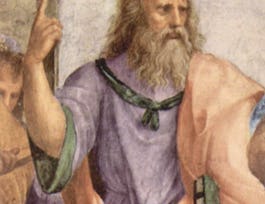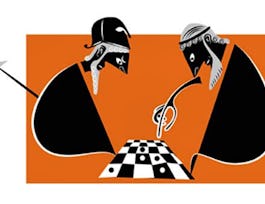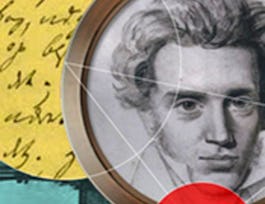What is philosophy? How does it differ from science, religion, and other modes of human discourse? This course traces the origins of philosophy in the Western tradition in the thinkers of Ancient Greece. We begin with the Presocratic natural philosophers who were active in Ionia in the 6th century BCE and are also credited with being the first scientists. Thales, Anaximander, and Anaximines made bold proposals about the ultimate constituents of reality, while Heraclitus insisted that there is an underlying order to the changing world. Parmenides of Elea formulated a powerful objection to all these proposals, while later Greek theorists (such as Anaxagoras and the atomist Democritus) attempted to answer that objection. In fifth-century Athens, Socrates insisted on the importance of the fundamental ethical question—“How shall I live?”—and his pupil, Plato, and Plato’s pupil, Aristotle, developed elaborate philosophical systems to explain the nature of reality, knowledge, and human happiness. After the death of Aristotle, in the Hellenistic period, Epicureans and Stoics developed and transformed that earlier tradition. We will study the major doctrines of all these thinkers. Part I will cover Plato and his predecessors. Part II will cover Aristotle and his successors.


Ancient Philosophy: Aristotle and His Successors
Taught in English
Some content may not be translated
68,708 already enrolled
(708 reviews)
Details to know

Add to your LinkedIn profile
11 quizzes
See how employees at top companies are mastering in-demand skills


Earn a career certificate
Add this credential to your LinkedIn profile, resume, or CV
Share it on social media and in your performance review

There are 5 modules in this course
Aristotle’s anti-Platonic metaphysics: the ultimate realities are ordinary objects of our experience, like people and animals. Each of these is a substances, the most fundamental type of being.
What's included
6 videos1 reading2 quizzes1 discussion prompt
Natural substances have matter and form, and natural processes are goal-directed. Every living thing, plants and animals included, has a soul that moves it.
What's included
6 videos2 readings3 quizzes1 discussion prompt
The motion of the universe is eternal and its cause is an eternal unmoved mover, Aristotle’s god. Our goal in life is to achieve happiness, which comes in two varieties: the human happiness we achieve by exercising the virtues of character, and the godlike happiness we achieve when we grasp eternal truths.
What's included
9 videos2 readings2 quizzes2 discussion prompts
Epicureans return to the atomism of Democritus, and find no purpose in nature. Philosophy is a therapeutic practice that removes fear and anxiety and provides us with the tranquility (ataraxia) of the gods.
What's included
8 videos4 readings2 quizzes2 discussion prompts
A providential god is at work in every detail of the cosmos, where everything happens by fate. Our goal in life is to accommodate ourselves to this divine nature by giving up our concern for (but not our pursuit of) worldly objectives.
What's included
9 videos4 readings2 quizzes1 peer review2 discussion prompts
Instructor

Offered by
Recommended if you're interested in Philosophy

University of Pennsylvania

National University of Singapore

University of Copenhagen
Why people choose Coursera for their career




Learner reviews
Showing 3 of 708
708 reviews
- 5 stars
84.03%
- 4 stars
13.84%
- 3 stars
1.27%
- 2 stars
0.56%
- 1 star
0.28%

Open new doors with Coursera Plus
Unlimited access to 7,000+ world-class courses, hands-on projects, and job-ready certificate programs - all included in your subscription
Advance your career with an online degree
Earn a degree from world-class universities - 100% online
Join over 3,400 global companies that choose Coursera for Business
Upskill your employees to excel in the digital economy
Frequently asked questions
Access to lectures and assignments depends on your type of enrollment. If you take a course in audit mode, you will be able to see most course materials for free. To access graded assignments and to earn a Certificate, you will need to purchase the Certificate experience, during or after your audit. If you don't see the audit option:
The course may not offer an audit option. You can try a Free Trial instead, or apply for Financial Aid.
The course may offer 'Full Course, No Certificate' instead. This option lets you see all course materials, submit required assessments, and get a final grade. This also means that you will not be able to purchase a Certificate experience.
When you purchase a Certificate you get access to all course materials, including graded assignments. Upon completing the course, your electronic Certificate will be added to your Accomplishments page - from there, you can print your Certificate or add it to your LinkedIn profile. If you only want to read and view the course content, you can audit the course for free.
You will be eligible for a full refund until two weeks after your payment date, or (for courses that have just launched) until two weeks after the first session of the course begins, whichever is later. You cannot receive a refund once you’ve earned a Course Certificate, even if you complete the course within the two-week refund period. See our full refund policy.



